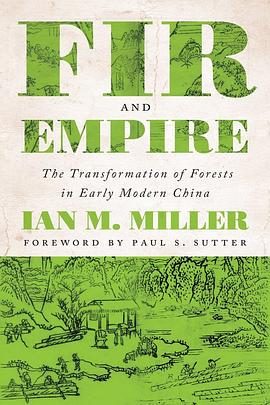
Book Cover
Title: Fir and Empire: The Transformation of Forests in Early Modern China
Author: Ian M. Miller
Publisher:University of Washington Press
Published:June, 2020
ISBN: 9780295747330
About this book
The disappearance of China’s naturally occurring forests is one of the most significant environmental shifts in the country’s history, one often blamed on imperial demand for lumber. China’s early modern forest history is typically viewed as a centuries-long process of environmental decline, culminating in a nineteenth-century social and ecological crisis. Pushing back against this narrative of deforestation, Ian Miller charts the rise of timber plantations between about 1000 and 1700, when natural forests were replaced with anthropogenic ones. Miller demonstrates that this form of forest management generally rested on private ownership under relatively distant state oversight and taxation. He further draws on in-depth case studies of shipbuilding and imperial logging to argue that this novel landscape was not created through simple extractive pressures, but by attempts to incorporate institutional and ecological complexity into a unified imperial state.
Miller uses the emergence of anthropogenic forests in south China to rethink both temporal and spatial frameworks for Chinese history and the nature of Chinese empire. Because dominant European forestry models do not neatly overlap with the non-Western world, China’s history is often left out of global conversations about them; Miller’s work rectifies this omission and suggests that in some ways, China’s forest system may have worked better than the more familiar European institutions.
About the Author
Ian M. Miller is assistant professor of history at St. John’s University. He received his PhD from Harvard University, andspent 2016-17 as a program fellow in agrarian studies at Yale University. His research focuses on the long-term social and environmental history of China, and also engages with world environmental history, forest history, energy history, and research methods in digital humanities. He is currently working on a history of Chinese forestry, tentatively titled State, Market, and Forest in Early Modern China.
Advance Praise
This pathbreaking addition to the sparse English-language literature on China’s forest history far surpasses all existing works in terms of scope and scholarly rigor. Miller’s work and the arguments it advances could genuinely transform the field of Chinese environmental history.
- Micah S. Muscolino, University of California, San Diego
Excellent . . . Miller problematizes the notion of Chinese premodern deforestation and, more broadly and significantly, the idea that premodern China was somehow deficient in its environmental governance in comparison to its European contemporaries.
- David A. Bello, author of Across Forest, Steppe and Mountain: Environment, Identity and Empire in Qing China’s Borderlands